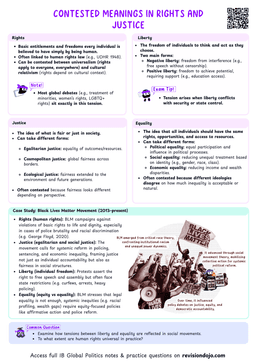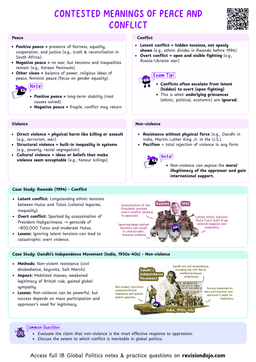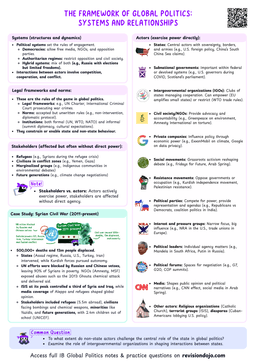Understanding Sovereignty
Sovereignty
Sovereignty means a state's independence and control over its territory. States are expected to govern effectively, make decisions within their borders and control what happens inside their territory.
- While many associate sovereignty with the Peace of Westphalia, its meaning has evolved significantly, especially with the rise of international human rights norms and the Responsibility to Protect (R2P) doctrine.
Key Sources of Sovereignty
1. Possession and Use of Force
- Use of Force Within the State:
- The use of force is considered essential for maintaining state governance.
- States are expected to have a monopoly on the use of force, without it, society could collapse into chaos.
- States usually have a judicial system and national police forces, with additional local or regional policing depending on the state's size.
- Use of Force Against Other States:
- Most states maintain armed forces, but the use of force externally is meant to be avoided under international norms.
- The international community generally agrees that force is only justified if a state suffers an armed attack that breaches its sovereignty.
- Traditional views of warfare (armed attacks) may not always fit modern conflicts, where attacks can be more unconventional.
2. Legal Sovereignty
- Refers to the recognition of a state's authority by international law.
- Enshrined in documents like the United Nations Charter, which emphasizes territorial integrity and political independence.
- International laws aim to:
- Promote friendly and cooperative relations between states
- Protect basic human rights for all individuals
- Resolve international disputes and prevent conflicts
- Limit both the internal and external use of force
- Regulate international trade and shipping rules
- Control and restrict the development of weapons
- The United States Declaration of Independence (1776) embodies popular sovereignty, stating that governments derive "their just powers from the consent of the governed."
3. Economic Sovereignty
- Involves a state's control over its economic resources and policies.
- Includes the ability to regulate trade, taxation, and monetary policy.
- Venezuela's nationalization of its oil industry in the early 2000s was an assertion of economic sovereignty, aimed at reducing foreign influence over its resources.
4. Cultural Sovereignty
- Refers to a state's ability to preserve and promote its cultural identity and values.
- Often linked to language policies, education systems, and media regulation.
- France's efforts to protect its language and culture through policies like quotas on foreign films illustrate cultural sovereignty in action.
Challenges to Sovereignty
Globalization
- Economic interdependence and transnational corporations can undermine economic sovereignty.
- Cultural globalization may erode national identities.
International Institutions
- Organizations like the United Nations and the European Union can limit state sovereignty through binding agreements and regulations.
- Non-State Actors
- Groups like multinational corporations, NGOs, and terrorist organizations can influence or undermine state sovereignty.
- The European Union's regulations on member states' fiscal policies illustrate how supranational institutions can constrain economic sovereignty.
- The Responsibility to Protect (R2P) doctrine allows for international intervention if a state fails to protect its population from atrocities, challenging traditional notions of sovereignty.
- Tech giants like Google and Facebook wield significant power over data and communication, raising questions about state control and digital sovereignty.
Theoretical Perspectives on Sovereignty
- Realism
- Views sovereignty as absolute and non-negotiable.
- Emphasizes the importance of state power and security in an anarchic international system.
- Liberalism
- Sees sovereignty as conditional, with states cooperating through international institutions to address global challenges.
- Constructivism
- Argues that sovereignty is a social construct, shaped by historical and cultural contexts.
- Emphasizes the role of norms and identities in defining sovereignty.
- How do cultural perspectives shape our understanding of sovereignty?
- Consider how Western and non-Western views might differ in their emphasis on individual rights versus collective responsibilities.
The Future of Sovereignty
- Digital Sovereignty
- As technology advances, states are grappling with issues of cybersecurity, data privacy, and control over digital infrastructure.
- Climate Change
- Transnational environmental challenges are prompting calls for greater global cooperation, potentially redefining sovereignty in the context of shared responsibilities.
- Rising Nationalism
- In some regions, nationalism is reasserting traditional notions of sovereignty, while in others, multilateralism continues to shape state behavior.
- Identify three sources of sovereignty and provide examples of how each is challenged in the modern world.
- How do different theoretical perspectives interpret the concept of sovereignty? Compare and contrast their views.


